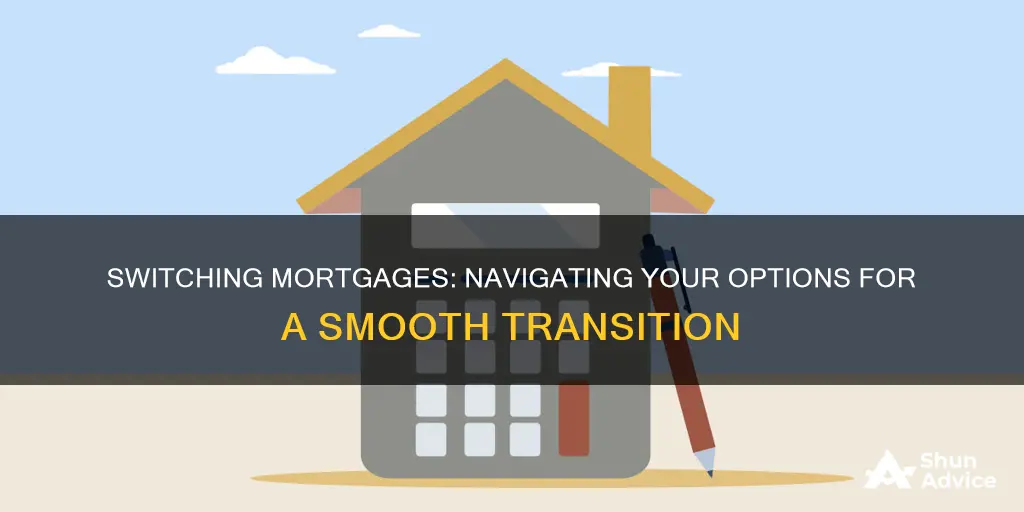
There are many reasons why you might want to switch your mortgage, including taking advantage of lower interest rates, poor customer service, or to find a deal that allows you to overpay on your mortgage without penalty. Before switching, it's important to consider the costs involved, including arrangement and legal fees, as well as any early repayment charges. You will also need to submit a new mortgage application, which will include providing documentation such as proof of identity, address, income, and employment status. It's also worth noting that switching to a new lender will result in another hard inquiry, which may lower your credit score.
What You'll Learn
- When to switch: typically when your current deal ends or when interest rates are low?
- Penalty fees: leaving a fixed-term deal early may incur charges
- Costs: exit fees, arrangement fees, legal fees, and valuation fees
- Application process: proof of identity, address, income, and employment status
- Benefits: saving money, avoiding penalties for overpayments, and better customer service

When to switch: typically when your current deal ends or when interest rates are low
The best time to switch mortgages is typically when your current deal ends or when interest rates are low. Standard mortgages usually have a maturity date of five years. Every five years, you can either renew your mortgage term with your existing lender or switch to a new lender.
If you switch before your mortgage is up for renewal, you may face a penalty of up to three months of interest payments on the outstanding amount or the interest rate differential (IRD). The IRD is the difference between your current interest rate and the rate the lender can charge upon renewal. In most cases, the penalty fees will outweigh any interest savings from switching to a lender with a lower interest rate. Therefore, it is generally recommended to wait until your mortgage term is about to mature before switching.
When interest rates are low, you may be able to take advantage and switch to a mortgage with a lower interest rate, potentially saving you money on your monthly payments and the total interest over the life of the loan. However, it is important to consider all the loan costs disclosed in the annual percentage rate (APR) to determine if you will actually save money by switching.
In addition to interest rates, there are other factors to consider when deciding when to switch mortgages. These include the outstanding balance on your mortgage, whether you have a fixed-rate mortgage, and your employment status. It is also important to compare mortgage rates and lenders to find the best deal for your financial needs.
Removing an Ex-Spouse from a Joint Mortgage
You may want to see also

Penalty fees: leaving a fixed-term deal early may incur charges
When considering switching your mortgage, it is important to be aware of the various fees that may be incurred, especially if you are leaving a fixed-term deal early. Early repayment charges, also known as penalty fees, can be quite costly and may negate any potential savings from switching to a lower interest rate. These charges can run into hundreds or even thousands of pounds, so they should not be overlooked when making financial calculations.
The exact amount charged in penalty fees will depend on the terms and conditions agreed upon with your lender, as outlined in your original mortgage agreement and annual mortgage statements. In general, the further you are into the initial rates period, the higher the fee will be. For instance, mortgages with longer fixed-term periods, such as five years, will typically have higher early repayment charges than those with shorter terms, like two years.
If you are considering leaving a fixed-rate mortgage early, it is advisable to seek professional advice from a mortgage broker or adviser. They can help you navigate the complexities of different termination fee structures and explore alternatives or negotiate better solutions with your current lender. Additionally, they can assist in finding a new lender who may offer free legal and valuation services as part of a remortgage package deal, potentially saving you money.
It is worth noting that there are certain circumstances where you may be able to avoid penalty fees. For example, if you have six months or less remaining on your current term, some lenders may allow you to refinance without incurring early repayment charges. Alternatively, if you plan to switch to a new lender, they may offer to cover some or all of the legal and valuation fees associated with the switch, making it a more financially viable option.
To summarise, leaving a fixed-term mortgage deal early can result in significant penalty fees, which should be carefully considered before making any decisions. By understanding the potential costs, seeking professional advice, and exploring alternative options, you can make an informed choice about whether to switch your mortgage and ensure you get the best deal to suit your financial needs.
Settling Second Mortgages: Post-Chapter 7 Bankruptcy
You may want to see also

Costs: exit fees, arrangement fees, legal fees, and valuation fees
When switching mortgages, there are several costs you may need to consider, including exit fees, arrangement fees, legal fees, and valuation fees. Let's break down each of these costs:
Exit Fees:
Exit fees, also known as mortgage completion fees, deeds release fees, or exit administration fees, are charged when you close your current mortgage account. This can occur when you switch to another lender or move to a different deal with your current lender. These fees typically range from £50 to £200, but they can vary depending on your lender. It's important to note that you may also be charged an exit fee when you finish paying off your mortgage.
Arrangement Fees:
Arrangement fees, also known as product fees or application fees, are charged by the lender to set up your new mortgage. These fees can vary significantly, ranging from £500 to £2,000, with an average of about £1,000. In some cases, the arrangement fee might be charged as a percentage of the loan rather than a flat fee. You usually have the option to pay the arrangement fee upfront or add it to your mortgage, but adding it to your mortgage will result in paying interest on the fee over the life of the loan.
Legal Fees:
Legal fees are associated with the cost of hiring a solicitor or licensed conveyancer to handle the legal work involved in transferring your mortgage from one lender to another. These fees can vary but typically cost around £2,000, including VAT. The legal work includes removing the original lender's interest from the property and registering the new lender. Some lenders offer free legal work as part of the remortgage deal, but they will appoint their own solicitor.
Valuation Fees:
A valuation fee is required by lenders for their security to ensure that the property can be sold if you fail to repay the mortgage. The cost of a valuation can vary depending on the lender, property size, and value, typically ranging from £250 to £1,500. Some lenders offer free valuations, while others charge several hundred pounds for a mortgage valuation. It's important to note that a mortgage valuation is not a full structural survey and may not identify all necessary repairs.
Removing Your Name from a Mortgage Note
You may want to see also

Application process: proof of identity, address, income, and employment status
When switching mortgages, you will need to provide proof of identity, address, income, and employment status. Here is some information on what you will need to provide for each of these:
Proof of Identity
You will need to provide at least one document to prove your identity. Accepted forms of ID include a passport or driving licence. If you do not wish to send the original documents in the post, you can get them certified by a Post Office or Bank official, a Solicitor, or a Notary. You must ensure that all documents are clearly certified in black and white, and this must include specific wording, an official stamp, and a signature.
Proof of Address
You will need to provide at least one document to prove your address, and it must be a different document to the one used for proof of identity. Accepted documents include a recent utility bill (not a mobile phone bill) or bank statement from the last three months, a current council tax bill, or a mortgage statement or redemption statement dated within the last 12 months. If you are applying jointly with someone else, bills in joint names may be considered as proof of address for both individuals.
Proof of Income
You will need to provide proof of your income, typically in the form of your last three months' payslips or tax returns. If you are self-employed, you may need to provide an SA302 form or have your income attested by a certified public accountant. Lenders want to see that your income is stable and will continue for at least three years. They may also need to verify any bonus income you receive and how it is structured.
Proof of Employment Status
Mortgage lenders will verify your employment status by contacting your employer and reviewing relevant documents. They may ask for additional documentation, such as recent pay stubs, and will likely perform a second verification of employment before closing to ensure your circumstances have not changed. If you are switching jobs, it is recommended that you let your lender know as soon as possible so they can verify your new income.
Exploring Options: Strategies to Temporarily Pause Mortgage Payments
You may want to see also

Benefits: saving money, avoiding penalties for overpayments, and better customer service
There are several benefits to switching your mortgage, including saving money, avoiding penalties for overpayments, and better customer service.
Firstly, switching your mortgage can help you save money. If you switch to a mortgage with a lower interest rate, you will pay less overall and may be able to pay off your mortgage sooner. This is especially beneficial if you are currently on an expensive Standard Variable Rate (SVR) or tracker mortgage. Additionally, some mortgages offer flexible features that allow you to overpay without penalty and then withdraw cash if needed, essentially using the mortgage like a high-interest savings account.
Secondly, by switching to a mortgage that allows overpayments without penalty, you can avoid the fees typically charged for paying more than your usual monthly amount. Most lenders allow a certain percentage of overpayment each year without penalty, usually around 10%, but this can vary. By switching to a flexible mortgage, you can make extra payments without incurring additional charges, giving you more control over your finances.
Lastly, switching your mortgage can potentially lead to better customer service. Different lenders will have varying levels of customer support, and by switching, you may find a provider that better meets your needs and provides more responsive and helpful service.
It is important to carefully consider your options and weigh the benefits against any potential drawbacks, such as early repayment charges or new mortgage arrangement fees. Additionally, ensure you understand the terms of your current mortgage regarding overpayments and early repayment to avoid any unexpected penalties.
Recording a Mortgage in QuickBooks: A Step-by-Step Guide
You may want to see also
Frequently asked questions
First, you need to find out how much is still owed on your existing mortgage, the interest rate you are currently paying, and the term remaining. You will also need a rough estimate of how much your home is currently worth. Next, compare mortgage rates to find out who is offering the best rates and whether it makes financial sense to switch. Once you've chosen a new lender, they'll issue you with a mortgage switching pack which you'll need to fill out. Remember that you'll need to provide documentation such as proof of identity, proof of address, proof of income, and evidence of how you manage your money.
Switching mortgages can save you money on your monthly payments and the amount you pay in total interest over the life of your loan. It can also allow you to increase your monthly payments and save money in interest, or give you the option to overpay on your mortgage without being penalised.
There are a few potential fees to be aware of when switching your mortgage, including legal fees, arrangement and booking fees, valuation and conveyancing fees, and penalty fees for ending your current mortgage agreement early.







